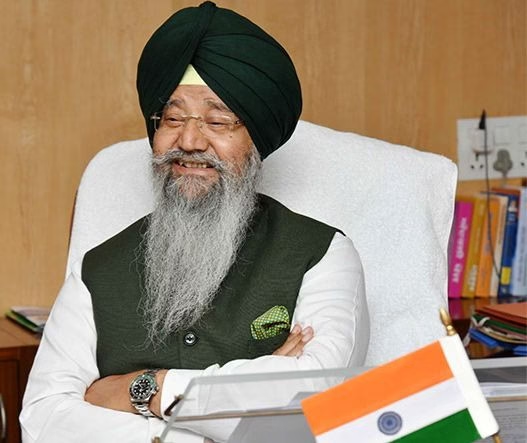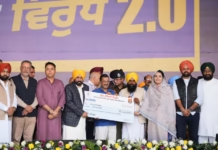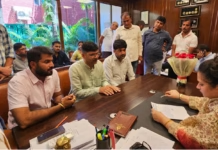Decline of Parliamentary Decorum: The Crisis of Debate in Punjab Assembly-Iqbal Singh Lalpura
Iqbal Singh Lalpura/ July 11,2025
The Punjab Legislative Assembly, once considered a forum of enlightened discourse and democratic expression, has been steadily witnessing the erosion of its decorum and credibility. The House, which includes some of the most responsible figures in a democratic setup—such as the Leader of the House (Chief Minister), Ministers, the Leader of the Opposition, and all elected MLAs—was created to reflect the voice of every citizen of Punjab. Yet, what is unfolding within its walls increasingly resembles a theatre of accusation and personal vendetta, rather than a dignified space for deliberation on the state’s pressing issues.
The Speaker of the Assembly, who is constitutionally entrusted to rise above party lines and ensure the conduct of debate remains within parliamentary norms, often finds their role challenged or overshadowed by the political noise and procedural violations that have become all too common.
Parliamentary democracy is distinguished by its language—refined, respectful, and reasoned. It is this language that allows deeply contested ideas to be debated without degenerating into chaos. Unfortunately, in Punjab, the standard of discussion has significantly deteriorated. Debates today often spiral into personal accusations, theatrical outbursts, and disruption tactics, with MLAs shouting over each other and engaging in behaviour more befitting a street quarrel than a constitutional forum.
It is important to note that this decline is not confined to any single party or individual. Both the treasury and opposition benches bear responsibility. When debates become focused on attacking individuals—often those not even present in the House, including those who passed away decades ago—the discussion loses relevance and drifts away from the critical issues confronting the people.
Parliamentary rules, as defined by the Rules of Procedure and Conduct of Business in Legislative Assemblies, clearly prohibit members from casting aspersions on individuals not present to defend themselves. Yet, accusations are routinely made against historical figures, freedom fighters, and leaders long deceased, often used to score ideological or political points. This distorts history, distracts from present-day governance challenges, and erodes the sanctity of the Assembly.
In the March 2024 budget session, the focus was supposed to be on fiscal responsibility and planning for Punjab’s mounting debt. However, the session was marred by repeated adjournments, walkouts, and personal attacks. On multiple occasions, important financial announcements were drowned out by shouting matches between MLAs, with opposition members throwing papers and treasury benches responding with equal hostility. In one instance, the Speaker was forced to leave the Chair, a symbolic low point for the institution.
As Justice M. C. Chagla once said,“The strength of democracy lies not in how vocally we shout, but in how deeply we listen and respond.”
By this measure, the Assembly is growing weaker with every passing day.
One of the fundamental responsibilities of the state—and by extension, of its legislators—is the protection of life and property. This is the bare minimum expected from a functioning government. When law and order collapse, so too does the economic and social fabric of the state.

Punjab today is at a dangerous crossroads. The state has witnessed an increase in drug abuse, organised crime, farmer suicides, and urban unemployment. Law enforcement struggles with both morale and capability, while public trust continues to diminish. Public perception equates politics with chaos, largely because of what is witnessed in the Assembly.
A functioning legislature should be a forum for discussing crime policy, economic revival, education reform, and social justice. But when these are sidelined for political stunts and shouting matches, the damage is not limited to legislative decorum. It strikes at the very foundation of public trust.
Today, Punjab stands near bankruptcy, with mounting debts, a stagnant manufacturing sector, and declining agricultural returns. Without serious policy debates and legislative clarity, there can be no path to recovery. Investment, innovation, and infrastructure development require predictability, security, and governance continuity—all of which are undermined when the Assembly turns into a circus.
There is no economic development without law and order. And there can be no law and order unless legislators uphold the law themselves, at least within the sacred walls of the Vidhan Sabha.
As B. R. Ambedkar warned during the drafting of the Constitution:“If we wish to preserve democracy, we must hold fast to constitutional methods of achieving our social and economic objectives.”
The people of Punjab are not naïve. They have watched with patience—and growing frustration—for over five decades as law and order have repeatedly faltered. From the militancy period of the 1980s and 90s to present-day administrative breakdowns, the ordinary citizen has paid the price for political irresponsibility.
The demand of the people is simple: Peace. Stability. Governance. Jobs. Justice.
And yet, the very representatives they elect to safeguard these values often squander Assembly time on pointless bickering, wasting taxpayer money and offering no meaningful solutions.
In the 2023 Monsoon Session, nearly 30% of scheduled time was lost to adjournments and disruption. This included days when critical discussions on farmer compensation, school closures, and employment schemes were scheduled. These delays affect policy implementation, budget releases, and administrative planning.
The end result? A state that continues to drift, with no firm hands on the rudder.
The Punjab Assembly is not a film set, nor is it a stage for political drama. It is a sacred space entrusted by the people for shaping the future of the state. Those who occupy its benches must realize that they are not just representatives of their parties but of every man, woman, and child in Punjab.
Legislators must be reminded that millions of youth in Punjab are watching them, some disillusioned, others still hopeful. The example they set will determine whether democracy survives in spirit or becomes hollow in practice.
We, the law-abiding citizens of Punjab, make a humble but urgent request to our elected representatives:
Please restore the dignity of the Assembly. Set an example of leadership, respectful debate, and a mission-oriented approach to governance.
We urge the Speaker of the House to take stronger steps to enforce parliamentary conduct. We request both the Chief Minister and the Leader of the Opposition to engage in constructive dialogue, rather than endless confrontation.
Punjab does not need heroes who shout the loudest; it needs leaders who think, speak, and act with wisdom and restraint.
Towards a Better Punjab
The state of Punjab has produced some of the greatest visionaries in Indian history , Chankiya ,Maharaja Ranjit Singh, Shaheed Bhagat Singh, Baba Banda Singh Bahadur. Their lives were marked by courage, clarity, and commitment to justice.
Can our present-day representatives rise to even a fraction of that standard?
Sri Guru Granth Sahib guides us :
“Sachhu oṛai sabh ko upar sach aachaar.”
Truth is higher than everything—but higher still is truthful living.
Let this be the guiding principle in every legislative debate.
Let Punjab’s Assembly reclaim its role—not just as a lawmaking body, but as the moral conscience of the state.
NOTE: The views expressed are personal. Author is Former IPS Officer | Former Chairman, National Commission for Minorities.












